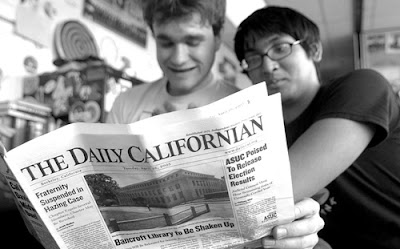 "IF YOU THINK you know your path in life, you're wrong," said Philadelphia Inquirer sports columnist Bob Ford.
"IF YOU THINK you know your path in life, you're wrong," said Philadelphia Inquirer sports columnist Bob Ford.He said that he had six majors (art history, psychology, English and a few others) while studying at the University of Maryland. He landed on journalism after learning there were academic advisors, and one suggested that path.
He graduated and got a job at the Easton Star Democrat on Maryland's Eastern shore. His first story was a duck calling competition. He next went to the Delaware County Daily Times as a Phillies beat writer. He moved to the Philadelphia Inquirer as a Sixers beat writer, then segued into general assignment sports reporting (Olympics, World Cup soccer, Tour de France, etc). In 2003, he became a sports columnist, opining on just about everything, though mostly about the big four professional sports teams.
As a sports writer, he's traveled to 14 countries and visited nearly every large city in the United States.
These days, he blogs, appears on video and tweets.
Here are a few things he said that stood out for me:
• The thirst for information has never been higher than now. The Inquirer has never had more readers than now. Many people just read online, as opposed to in print.
• "If you can write," he said, "there will be a place for you somewhere."
• The Internet, because of the rush to push out content, breeds a lack of reflection and thought.
• Bloggers get stuff wrong sometimes and that is regrettable. "When you're driving 100 miles per hour, you're more likely to have an accident than when you're doing 25," he said.
• The reality is that ten seconds after a story breaks, no one remembers who had it first.
• In the age of the Internet, newspaper sports reporters and writers should be focusing on this: "What does it mean?"
• As a beat writer, he had to pull his punches/ choose his battles sometimes. Seasons are long and he'll spend much more time with the players than with his actual newspaper colleagues.
• When Charles Barkley said, "This is the kind of game that makes you want to go home and beat your wife," Bob and longtime Daily News beat writer Phil Jasner offered Sir Charles a mulligan. Charles declined and it became a huge story.
• Joe Morgan once threatened to kick Bob's ass.
• How do you resist only writing controversial stuff to draw audiences? Recognize that during your career, you'll write thousands of stories, not one.
• Every story you do is like a job interview.
• For future sports writers (and journalists in general), Bob said you should be getting experience now. Start a blog. Write for the school paper. Freelance. Get clips that prove you can actually do this.
• After graduating from college, he sent his clips to around 60 newspapers.
• You should develop as many multimedia skills as possible. Modern journalists need to multi-task.
What stood out for you?






